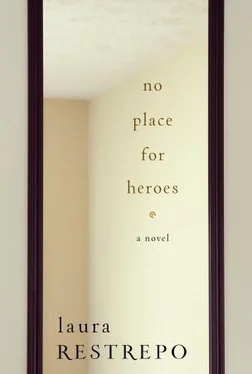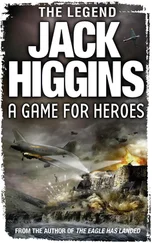“Is that what they say in Argentina, a Turk in a fog?” he asked.
“It’s a saying.”
Lorenza cursed her poor sense of direction, that hopeless flaw that Trotsky called topographical cretinism, which makes any city into a labyrinth. Unfortunately, Mateo had inherited this trait, a tendency to roam endlessly for lack of an internal compass. The good thing about being so out of it was that you never even realized you were lost. Ayacucho, Riobamba, Hipólito Yrigoyen, they had followed the whim of their feet for hours, and the streets of the city center danced around them. Tucumán? Virrey Cevallos? Sarandí?
They didn’t hold hands anymore. It had been a few years since they had last done so. Before that, the boy’s hand fit in hers as if they had been made for each other, a big hand and a small hand, and they liked to pretend to fit them together like pieces of Lego. But by the time it was her hand that fit into his, Mateo did not want anything to do with this old game. He peeled away from her indignantly when she tried to hug him and he looked all around to make sure that no one had caught them in such a compromising position. Then Lorenza would restrain herself not to anger him, but she recognized a bit of herself in that distance that her son put between them. As a child, he had always clung to her, the two huddled together like ferrets in their burrow — if it was after midnight, the nightmares chased him to her bed; if they were at the beach, he wanted to fight like sharks; if they were on the street, he zigzagged in front of her, stepping on her with his oversize, thick-soled sneakers. They were like some creature with two heads and eight limbs. And how often had they found themselves in the narrow changing room of a store, as she struggled to try on the clothes and he played with his Transformers on the floor? Or even at home, as she tried to write while he practiced a jujitsu hold on her arm, or he watched his favorite TV program and she force-fed him spoonfuls of soup, or he tied knots in her hair, or she combed his and he pushed her away? At some point, Mateo became ruthless when it came to delineating his personal space and setting distances. He drew a Maginot Line between them and would not allow her to cross it by even a centimeter. And that’s how it should be. Lorenza understood that, as well as the fact that Mateo was no longer her child, no longer a kid, hers or anyone’s, and she realized how much it upset him when she ignored this truth. Mateo was justified in his territorial claims, it was only natural. But that hardness made tears well in her eyes, tears which she was allergic to.
“Do you think Ramón has arrived at his house in Buenos Aires,” he asked, “or at that cabin in the snowy mountains—”
“Or at his bar in La Plata. If you want, you can call him from the public phone. I have the number in my pocket.” He shook his head. Before they realized it, it was past eleven and they found themselves in front of the obelisk, which split in two the red splendor of a giant Coca-Cola billboard and speared upward toward the darkness. How had it become so late? It was something that often happened to them. Although they no longer walked holding hands, their conversation was still as entangling as any embrace and time passed them by unwittingly and the rest of the world remained in the wings. And so they kept on walking, by God’s grace, at times entertaining each other and at others simply gazing at the ground, and when she thought she recognized Santa Fe, they had returned to the Avenida de Mayo.
“It’s no use, Mateo, we’re going around in circles.”
“But you lived here, Lorenza, for years. How can you get lost?”
“So what? I still get lost in Bogotá. Wait! Do you smell that? That corner smells like Buenos Aires again.”
They ended up in a dirty and crowded street full of theaters and nightclubs, which they found out was Lavalle. Apprehensively, they made their way past the pale neon lights which failed to make the air warm, sidestepping hands that offered passes for the strip shows.
“Let’s get out of here, Lorenza. This place is like a frontier. Or look, let’s go into this theater, it looks like a horror film.”
The movie was terrible, but Mateo didn’t care. When his mother suggested that they leave, he said he wanted to see the ending. She thought her son would do anything, even sit through some vile movie, as long as it stalled the return to their hotel room where at some point he had to make that call which he had no idea how to make.

“RAMÓN MUST THINK I’m weak,” Mateo said. “A weakling without any character. He must think that because he didn’t raise me, I turned out soft. I need to tell him how I smacked a kid named Joe Ferla in the face in Rome. And when I tell him, you confirm it, tell him he has to believe me because it’s the truth.”
When they lived in Rome, the rector’s secretary from the institute where Mateo studied had called Lorenza one day to tell her that her son had a scontro di una inammissibile aggressività with another student, and the rector needed to see his parents. It sounded unbelievable to Lorenza. Ever since he had been a child, her son had known how to defend himself, but he would never set out to purposefully harm anyone, or to go after anybody with his feet or kicking. The years of unmitigated rage would come later, with adolescence, but as a child he had been peaceful and compliant. The institute was the Esposizione Universale Roma, and during the long metro ride from the city center to see the rector, Lorenza thought about the only other incident in Mateo’s life where he had revealed a violent side. It had happened years before, at the school he had attended in Mexico City.
“Here it is,” the Mexican teacher had told her, indicating a display laid out on a table, all the drawings that Mateo had done during the semester. “There isn’t one without weapons, wars, aggression, and blood …”
The drawings made an impression on Lorenza, but mostly because of their vibrant colors and beauty, and she said so: “He’s a good artist, my Mateo …”
But the teacher wasn’t interested in aesthetic judgments, what alarmed her were the violent impulses that flowered in the pieces, indicating the urgent need for a psychological evaluation. She said that Mateo must have been affected by some very grim events, those were her words, which perhaps he had lived through in Colombia. Lorenza did not respond. She gathered the drawings, one by one, with the devotion of any mother handling the artwork of her child, as if it belonged in a museum.
That same night, she spread the drawings on the floor of the living room to look at them again with Mateo, who at that time must have been around seven.
“Your teacher says that they are violent,” she said. “What do you think?”
“Violent, what do you mean?”
“Well, she says that these figures here are attacking—”
“They’re not attacking, Lolé, they are defending themselves. That’s very different.”
It was a reasonable interpretation. There was definitely a war being played out in those drawings, a bloody one at that, this much at least she had to concede to the teacher. But it was also true that all the figures were indeed in defensive stances, which also worried Lorenza. She couldn’t sleep that night thinking about what it was that her son had to defend himself against with such zeal. The following morning she asked him about it at breakfast.
“Why so many defenses and armaments, Mateo? I mean, in your drawings … all those shields and helmets.”
“You never know what will happen. It’s always good to be prepared.” His reply was rather vague, so she decided to broach the subject from another angle.
Читать дальше













